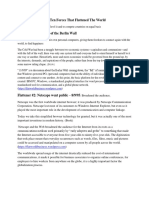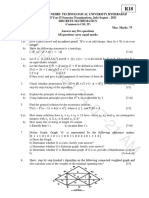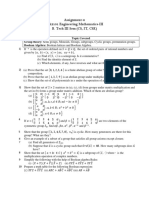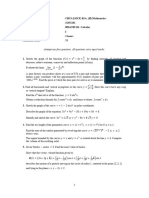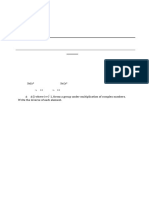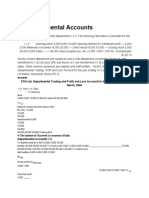0 ratings0% found this document useful (0 votes)
35 views3 - Hons - Mathematics - SH-MTH - 302 - C-6 - 1616006212331
3 - Hons - Mathematics - SH-MTH - 302 - C-6 - 1616006212331
Uploaded by
Santanu BisuiThis document provides the details of a Group Theory exam, including:
1. Five 2-mark short answer questions covering topics like properties of groups of specific orders, examples of groups, and proofs of subgroup properties.
2. Four 5-mark longer answer questions, including proofs about expressing permutations as products of cycles, properties of subgroup generation, and the relationship between finite subgroup cardinalities.
3. One 10-mark question with multiple parts, asking to prove properties of subgroups of rational numbers, apply Lagrange's theorem to Fermat's little theorem, and prove normality criteria and apply the first isomorphism theorem.
Copyright:
© All Rights Reserved
Available Formats
Download as PDF, TXT or read online from Scribd
3 - Hons - Mathematics - SH-MTH - 302 - C-6 - 1616006212331
3 - Hons - Mathematics - SH-MTH - 302 - C-6 - 1616006212331
Uploaded by
Santanu Bisui0 ratings0% found this document useful (0 votes)
35 views2 pagesThis document provides the details of a Group Theory exam, including:
1. Five 2-mark short answer questions covering topics like properties of groups of specific orders, examples of groups, and proofs of subgroup properties.
2. Four 5-mark longer answer questions, including proofs about expressing permutations as products of cycles, properties of subgroup generation, and the relationship between finite subgroup cardinalities.
3. One 10-mark question with multiple parts, asking to prove properties of subgroups of rational numbers, apply Lagrange's theorem to Fermat's little theorem, and prove normality criteria and apply the first isomorphism theorem.
Original Description:
Question paper honours
Original Title
3_HONS_MATHEMATICS_SH-MTH- 302- C-6_1616006212331
Copyright
© © All Rights Reserved
Available Formats
PDF, TXT or read online from Scribd
Share this document
Did you find this document useful?
Is this content inappropriate?
This document provides the details of a Group Theory exam, including:
1. Five 2-mark short answer questions covering topics like properties of groups of specific orders, examples of groups, and proofs of subgroup properties.
2. Four 5-mark longer answer questions, including proofs about expressing permutations as products of cycles, properties of subgroup generation, and the relationship between finite subgroup cardinalities.
3. One 10-mark question with multiple parts, asking to prove properties of subgroups of rational numbers, apply Lagrange's theorem to Fermat's little theorem, and prove normality criteria and apply the first isomorphism theorem.
Copyright:
© All Rights Reserved
Available Formats
Download as PDF, TXT or read online from Scribd
Download as pdf or txt
0 ratings0% found this document useful (0 votes)
35 views2 pages3 - Hons - Mathematics - SH-MTH - 302 - C-6 - 1616006212331
3 - Hons - Mathematics - SH-MTH - 302 - C-6 - 1616006212331
Uploaded by
Santanu BisuiThis document provides the details of a Group Theory exam, including:
1. Five 2-mark short answer questions covering topics like properties of groups of specific orders, examples of groups, and proofs of subgroup properties.
2. Four 5-mark longer answer questions, including proofs about expressing permutations as products of cycles, properties of subgroup generation, and the relationship between finite subgroup cardinalities.
3. One 10-mark question with multiple parts, asking to prove properties of subgroups of rational numbers, apply Lagrange's theorem to Fermat's little theorem, and prove normality criteria and apply the first isomorphism theorem.
Copyright:
© All Rights Reserved
Available Formats
Download as PDF, TXT or read online from Scribd
Download as pdf or txt
You are on page 1of 2
B.SC. THIRD SEMESTER (HONS.
) EXAMINATION 2021
Subject: Mathematics Course ID: 32112
Course Title: Group theory-I Course Code: SH/MTH/302/C-6
Full Marks: 40 Time: 2 Hours
The figures in the margin indicate full marks
Notations and symbols have their usual meanings.
1. Answer any five of the following questions: 2× 5=10
a) If 𝐺is a group of order 22, then prove that 𝐺 contains an odd number of elements of order
2.
b) Let ℝ denote the set of all negative real numbers. Can you define a binary operation ∗ on
ℝ so that (ℝ ,∗) becomes a group? Justify your answer.
c) Express the following permutation as a product of disjoint cycles in 𝑆 :
𝟏 𝟐 𝟑 𝟒 𝟓 𝟔 𝟕 𝟖
.
𝟓 𝟕 𝟖 𝟔 𝟒 𝟏 𝟐 𝟑
d) Prove that 𝑍(𝐺) = {𝑎 ∈ 𝐺|𝑎𝑔 = 𝑔𝑎 for all 𝑔 ∈ 𝐺} is a subgroup of the group 𝐺.
e) Find all the distinct left cosets of 𝐻 = 6ℤ in the group (ℤ, +).
f) Let 𝐴, 𝐵 be two normal subgroups of a group 𝐺. Then 𝐺/𝐴 ≃ 𝐺/𝐵 −prove or disprove.
g) Give an example of an infinite group 𝐺 such that each of its cyclic subgroups has cardinality
maximum 2.
h) Show that ℤ is not a homomorphic image of ℤ .
2. Answer any four of the following questions: 5× 4=20
a) Prove that any non-identity permutation 𝛼 ∈ 𝑆 (𝑛 ≥ 2) can be expressed as a product of
disjoint cycles, where each cycle is of length ≥ 2.
b) Let 𝑆 be a non-empty subset of a group 𝐺. Let < 𝑆 > denote the subgroup generated by 𝑆
in 𝐺, i.e., the smallest subgroup containing 𝑆 in 𝐺. Then prove that
< 𝑆 >= {𝑠 𝑠 … 𝑠 | 𝑠 ∈ 𝑆, 𝑒 = ±1, 𝑖 = 1,2, … , 𝑛; 𝑛 ∈ ℕ}.
c) Define the normalizer of a subset of a group 𝐺. Show that it becomes a subgroup of 𝐺. If 𝐻
is a subgroup of 𝐺, then prove that the normalizer of 𝐻 is the largest subgroup of 𝐺 in which
𝐻 is normal. 1+1+3
d) State and prove Cayley’s theorem for groups.
| || |
e) For any two finite subgroups 𝐻, 𝐾 of a group 𝐺, prove that |𝐻𝐾| = | ∩ |
.
f) Show that the set of all 8th roots of unity form a cyclic group with respect to the
multiplication of complex numbers. Also find all the generators of this group. 3+2
3. Answer any one of the following questions: 10× 1=10
a) (i) Prove that any finitely generated subgroup of the group (ℚ, +) is cyclic.
(ii) Prove Fermat’s little theorem using Lagrange’s theorem.
(iii) Let 𝐻 be a proper subgroup of a group 𝐺 and 𝑎 ∈ 𝐺 ∖ 𝐻. Suppose that for all 𝑏 ∈ 𝐺,
either 𝑏 ∈ 𝐻 or 𝐻𝑎 = 𝐻𝑏. Show that 𝐻 is normal in 𝐺.
(iv) Using first isomorphism theorem on a group prove that ℝ/ℤ ≅ 𝑆 , where 𝑆 is a unit
circle with center (0,0) and radius 1. 3+2+3+2
b) (i) Give an example (with reason) of a non-cyclic, non-commutative group of which each
subgroup is cyclic.
(ii) If H is the only subgroup of order 𝑚 in a group 𝐺, then prove that 𝐻 is normal in 𝐺.
(iii) In a group 𝐺, if 𝐺/𝑍(𝐺) is cyclic, then show that 𝐺 is abelian.
(iv) State and prove third isomorphism theorem for groups. 2+2+2+(1+3)
***
You might also like
- Group Theory MATH10079Document6 pagesGroup Theory MATH10079Loh Jun XianNo ratings yet
- English Level Test PDF Elementary A1 With Answers EnglishtestpdfDocument5 pagesEnglish Level Test PDF Elementary A1 With Answers EnglishtestpdfManil SchoolNo ratings yet
- Merchant House of Amketch PDFDocument120 pagesMerchant House of Amketch PDFBenn Doucet100% (5)
- The Ten Forces That Flattened The World: (Book)Document4 pagesThe Ten Forces That Flattened The World: (Book)Amna JawaidNo ratings yet
- Final Mtma Cc-Xii Es5q 19012022Document2 pagesFinal Mtma Cc-Xii Es5q 19012022Ujjivan MitraNo ratings yet
- Sem IV - MTMG - GE - CCDocument2 pagesSem IV - MTMG - GE - CCAbul HossainNo ratings yet
- BCS 303 TS 14Document1 pageBCS 303 TS 14arpitjaiswalyashu1No ratings yet
- 1stSem_2020_BCAC103Document4 pages1stSem_2020_BCAC103honey22bunny1190No ratings yet
- Unit-4 & 5 Possible QuestionDocument4 pagesUnit-4 & 5 Possible QuestionDhanraj dhanNo ratings yet
- IQDocument1 pageIQClash ClanNo ratings yet
- JulyAugust 2021Document1 pageJulyAugust 2021pallesirisha40No ratings yet
- Registration No:: Part-I Q1 Answer The Following Questions: (2 X 10) A) B) C)Document2 pagesRegistration No:: Part-I Q1 Answer The Following Questions: (2 X 10) A) B) C)ABINASH SAMANTARAYNo ratings yet
- Classwork Activity #3Document2 pagesClasswork Activity #3Chala1989No ratings yet
- WWW - Manaresults.Co - In: (Common To Ce, Eee, Me, Ece, Cse, Eie, It, MCT, Etm, MMT, Ae, Mie, PTM, Cee, MSNT)Document2 pagesWWW - Manaresults.Co - In: (Common To Ce, Eee, Me, Ece, Cse, Eie, It, MCT, Etm, MMT, Ae, Mie, PTM, Cee, MSNT)Mohan ReddyNo ratings yet
- Group Ring Field Practice ProblemDocument3 pagesGroup Ring Field Practice ProblemAbhik PanjaNo ratings yet
- Math Sem IV Imp 2018Document2 pagesMath Sem IV Imp 2018S N KNo ratings yet
- MT 5118 - Mathematics VDocument2 pagesMT 5118 - Mathematics VFindx proNo ratings yet
- MT5118Document6 pagesMT5118study.nayanaNo ratings yet
- Da DMGTDocument2 pagesDa DMGTShaurya 22BAI1173No ratings yet
- 3 DMGT Assignment Questions 30-10-2023Document3 pages3 DMGT Assignment Questions 30-10-2023chcharan779No ratings yet
- Nulpmss 42.105.113.39BSCHMTMC102Document2 pagesNulpmss 42.105.113.39BSCHMTMC102sohad99783No ratings yet
- Maths Assignment6 Group Theory QuesAndAnsDocument19 pagesMaths Assignment6 Group Theory QuesAndAnsbruhNo ratings yet
- Assignment-6 MA2101 Engineering Mathematics-III B. Tech III Sem (CS, IT, CSE)Document1 pageAssignment-6 MA2101 Engineering Mathematics-III B. Tech III Sem (CS, IT, CSE)GamefreakoneoneNo ratings yet
- Groups Ia Practice Sheet ADocument9 pagesGroups Ia Practice Sheet ABob CrossNo ratings yet
- CU-2022 B.Sc. (Honours) Mathematics Semester-2 Paper-CC-4 QPDocument4 pagesCU-2022 B.Sc. (Honours) Mathematics Semester-2 Paper-CC-4 QPmoinaksarkar21No ratings yet
- DM - Question BankDocument6 pagesDM - Question BankRutvika GhadiyaliNo ratings yet
- Mat-Cc-14-H R&B NC Group Theory-IiDocument2 pagesMat-Cc-14-H R&B NC Group Theory-IiyantramsaiNo ratings yet
- KAS103T Maths I Model QP-2020-21Document2 pagesKAS103T Maths I Model QP-2020-21Tushar SaxenaNo ratings yet
- Subgroup (Theorem 0.4.4), and (2) : Every Subgroup of A Cyclic Group Is Cyclic (Theorem by Giving A Generator. That Is, Write ( ) For SomeDocument1 pageSubgroup (Theorem 0.4.4), and (2) : Every Subgroup of A Cyclic Group Is Cyclic (Theorem by Giving A Generator. That Is, Write ( ) For SomeKumar Keshaw ShahiNo ratings yet
- JR 9Document39 pagesJR 9hossein mohammadiNo ratings yet
- Mat 203 QuestionsDocument5 pagesMat 203 QuestionsanujagadeeshmurthyNo ratings yet
- MSC Maths Entrance TestDocument5 pagesMSC Maths Entrance TestSwarna KhareNo ratings yet
- Math Dse4Document6 pagesMath Dse4facto GamerNo ratings yet
- Adobe Scan 18 May 2024Document13 pagesAdobe Scan 18 May 2024Shivendra BruhathradhNo ratings yet
- Abstract 2024 May Ba ProgDocument4 pagesAbstract 2024 May Ba ProgAjeet RaoNo ratings yet
- ASSIGNMENT Discrete MathematicsDocument7 pagesASSIGNMENT Discrete Mathematicssciencewale79858No ratings yet
- Class - XI Final Term Math 2020-21Document6 pagesClass - XI Final Term Math 2020-21wdymhereNo ratings yet
- 2020 Papers StattisticsDocument9 pages2020 Papers Stattisticsmadhurkhandelwal98712No ratings yet
- Bachelor of Science (B.SC.) Semester-I Examination Mathematics (Algebra and Trigonometry) Optional Paper-1Document3 pagesBachelor of Science (B.SC.) Semester-I Examination Mathematics (Algebra and Trigonometry) Optional Paper-1Swapnil KamdiNo ratings yet
- Mathematics PYQDocument2 pagesMathematics PYQSimantika ChakrabortyNo ratings yet
- Gtu Information Technology 3140708 Winter 2023Document3 pagesGtu Information Technology 3140708 Winter 2023kotvalbabanNo ratings yet
- Jumpstart AssignmentsDocument21 pagesJumpstart AssignmentsShivam PandeyNo ratings yet
- MAT203-Answer Key 2Document14 pagesMAT203-Answer Key 2anujagadeeshmurthyNo ratings yet
- Quick Review Class Xi (2)Document11 pagesQuick Review Class Xi (2)greezy070No ratings yet
- 4.algebraic Structures and MorphismDocument5 pages4.algebraic Structures and Morphismkimajam628No ratings yet
- Dse 4Document6 pagesDse 4Abhy SinghNo ratings yet
- 2-1 MFCSQN Bank R16Document8 pages2-1 MFCSQN Bank R16Bhargavipriyanka YarramNo ratings yet
- Ramaiah College of Arts, Science and Commerce I Semester Bca (Discrete Mathematics) AssignmentDocument5 pagesRamaiah College of Arts, Science and Commerce I Semester Bca (Discrete Mathematics) AssignmentDeepanshuNo ratings yet
- Algebra (Groups, Rings, Fields) : (A Brief Description of The Course To Be Put Here.)Document7 pagesAlgebra (Groups, Rings, Fields) : (A Brief Description of The Course To Be Put Here.)booby fischerNo ratings yet
- Assignment 4Document1 pageAssignment 4Akhlaq HusainNo ratings yet
- Mat 203 QuestionsDocument5 pagesMat 203 QuestionsFathima RishuNo ratings yet
- Tugas I (2023 - 2)Document2 pagesTugas I (2023 - 2)Vitto Rendi SetiawanNo ratings yet
- Njombe Pre Necta IIDocument4 pagesNjombe Pre Necta IIbrigittawilliam764No ratings yet
- Advanced Maths 2_dyampaye.co.TzDocument4 pagesAdvanced Maths 2_dyampaye.co.TzErick MwalukasaNo ratings yet
- Advanced Maths 2Document4 pagesAdvanced Maths 2youngtillionez99No ratings yet
- QPR322Document148 pagesQPR322apoorva m nNo ratings yet
- DSA - IT PYQ - 2024 MAY TO 2019 DEC - Aeraxia - inDocument10 pagesDSA - IT PYQ - 2024 MAY TO 2019 DEC - Aeraxia - inmilindnagare13No ratings yet
- Module 1: Numbers and Number Sense Lesson 1: SETS Learning Competency 3.2: Use Venn Diagram To Represent Sets, Subsets and Set Operations. I - ObjectivesDocument9 pagesModule 1: Numbers and Number Sense Lesson 1: SETS Learning Competency 3.2: Use Venn Diagram To Represent Sets, Subsets and Set Operations. I - Objectivesjoffrey andresNo ratings yet
- Aa Group Questions - UG1Document11 pagesAa Group Questions - UG1Soumyashree GhoshNo ratings yet
- Math-1 EngineeringDocument6 pagesMath-1 EngineeringNianNianNo ratings yet
- Factoring and Algebra - A Selection of Classic Mathematical Articles Containing Examples and Exercises on the Subject of Algebra (Mathematics Series)From EverandFactoring and Algebra - A Selection of Classic Mathematical Articles Containing Examples and Exercises on the Subject of Algebra (Mathematics Series)No ratings yet
- TechnoDocument2 pagesTechnoGemlyn de CastroNo ratings yet
- Department AccountsDocument14 pagesDepartment Accountsjashveer rekhiNo ratings yet
- JT15D Series Head IndexDocument4 pagesJT15D Series Head IndexEgor85No ratings yet
- Rule 51 Case DigestDocument2 pagesRule 51 Case DigestRochelle GablinesNo ratings yet
- UAS MKU Bhs. Inggris (GASAL 2021)Document5 pagesUAS MKU Bhs. Inggris (GASAL 2021)SyadivaNo ratings yet
- TSLB3113 THE Question (Final)Document4 pagesTSLB3113 THE Question (Final)KHAIRUL ANWAR BIN REDUAN T8No ratings yet
- Monster DesignDocument2 pagesMonster DesignNathan LuehrNo ratings yet
- Islamiyat MCQs – Important Solved MCQs About ZakatDocument18 pagesIslamiyat MCQs – Important Solved MCQs About ZakatSadia manzoorNo ratings yet
- AlphaOmegaRulesv0 5Document25 pagesAlphaOmegaRulesv0 5herodofcowsNo ratings yet
- Incomet BROCHUREDocument17 pagesIncomet BROCHUREGurpreet SinghNo ratings yet
- BBVA Innovation Edge. APIS (English)Document113 pagesBBVA Innovation Edge. APIS (English)BBVA Innovation Center100% (1)
- Ria 1Document3 pagesRia 1EMEKA IKECHUKWUNo ratings yet
- Gramatica Resumen 2 CopiasDocument4 pagesGramatica Resumen 2 CopiasMiriam PulidoNo ratings yet
- Decision Making RazorsDocument24 pagesDecision Making RazorskialtechnologyNo ratings yet
- Crypto NotesDocument89 pagesCrypto NotesGürcan ÇetinkayaNo ratings yet
- Mathematics 1Document11 pagesMathematics 1Marose Villanueva de Guzman100% (6)
- Better Than He Can (Camren)Document38 pagesBetter Than He Can (Camren)mercedesmgNo ratings yet
- Brave Love Kit Brave Love Bible StudyDocument4 pagesBrave Love Kit Brave Love Bible StudyEstella CauaneNo ratings yet
- Electricty Revision ExamDocument11 pagesElectricty Revision Examdavid98kimNo ratings yet
- ACSL by ExampleDocument217 pagesACSL by ExampleChristos RicudisNo ratings yet
- Chapter 9 Part 10Document4 pagesChapter 9 Part 10dayaonikkadarezbsbaNo ratings yet
- SSIManualDocument12 pagesSSIManualAhmed MousawyNo ratings yet
- Post GATE-Admission 2020 IITs - CSDocument66 pagesPost GATE-Admission 2020 IITs - CSshubham gandhiNo ratings yet
- Flex Power Guide 1.3.2Document191 pagesFlex Power Guide 1.3.2Guillermo García GándaraNo ratings yet
- City of Dallas Complaint As FILEDDocument29 pagesCity of Dallas Complaint As FILEDcityhallblogNo ratings yet
- SpeechDocument1 pageSpeechFaraz AhmedNo ratings yet
- Module 3 Nursing Skills Procedure On GI, Endo-Metab Concept (A)Document18 pagesModule 3 Nursing Skills Procedure On GI, Endo-Metab Concept (A)Nashebah A. BatuganNo ratings yet



